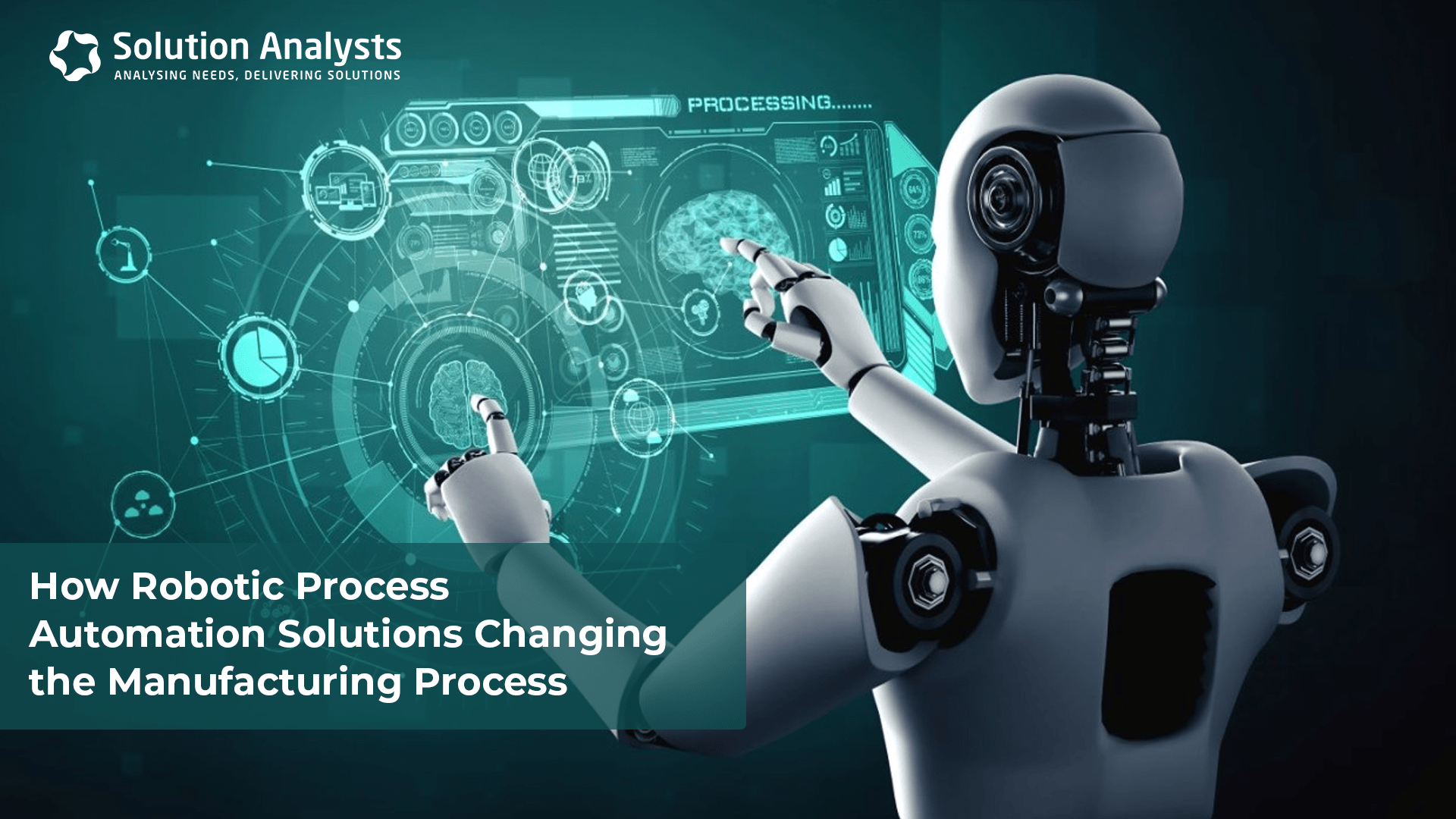How Robotic Process Automation Solutions Changing the Manufacturing Process

Physical robots for assembling, testing, and packaging products in the manufacturing industry are nothing new. However, Robotic Process Automation solutions have taken automation in the manufacturing sector to the next level. Overall, the manufacturing sector has various pain points such as time-intensive tasks, outdated supply chain management systems and rapidly changing regulatory requirements.
In order to overcome the mentioned challenges, manufacturing companies are turning to Robotic Process Automation. RPA is one of the key enablers along with AI in end-to-end process automation. Utilizing RPA can streamline rule-based back office operations such as payment processing, report generation, vendor communication, and many more.
Let’s move further, and know the role of RPA in the manufacturing sector.
How RPA Works?
A bot is a part of RPA software. Users can program these bots to perform human-like actions such as opening an email or copying data from one application to another. They can also be programmed to follow certain rules and make informed decisions. RPA can speed up the work and give accurate results. As a result, businesses can scale up in the long term. As your manufacturing company expands, you can empower your team with RPA bots to reduce the pressure of monotonous tasks.
Key RPA Application In Manufacturing
Hiring robotic process automation services allows manufacturing companies to go for a wide variety of applications.
Have a look at some of the key applications of RPA in manufacturing.
-
Vendor Communication
Daily communication between customers, vendors, and the internal workforce goes through a high amount of manual work. For example, in case one needs the status of goods shipped, a human professional first finds the email communication, tracks the shipment status in the ERP system, sends an update to the customer, and closes the case.
If the same is done by RPA, the entire process goes by opening the email, reading the text, downloading attachments, logging into the ERP portal, looking for the status of the shipment, answering the customer, and lastly, moving on to the next customer email.
-
Purchase Order Creation
The manual process for purchase order creation can be exhausting for enterprises as it requires dealing with a wide range of product categories. Integrating RPA can automate the entire PO creation process. It enables 100% accuracy and fast results. Bots can collect data from independent systems, go for email approval from departmental heads, and process the request for PO generation.
-
Inventory Management
To make sure that demand can be fulfilled, inventory levels must be monitored in real-time. Automation of inventory tracking, stock-level alerts, and product reordering is possible when levels fall below a predetermined threshold. There is not much requirement for human involvement in doing such tasks.
An added benefit of referring an RPA service provider company for automation
is the automatic generation of a thorough audit trail. Live dashboards and reports also offer details on internal operations and business patterns that may indicate expected bottlenecks. With the help of these insights, manufacturers can eliminate supply chain disruptions which allow process improvement and optimization.
Read More : Top 10 Trends of DevOps in 2023 and Beyond to Watch Out
Key Benefits of RPA in Manufacturing
Manufacturing enterprises are highly dependent on reliable processes. They need to continuously keep pace with the rising demand for speedy and more efficient production. However, their ability to achieve speed and efficiency can be disturbed by human errors due to the high volume of repetitive tasks and processes.
Implementing RPA solutions in various manufacturing operations can bring some significant advantages to businesses.
Here are the top benefits.
-
Improved Efficiency
The most sought-after benefit is improvement in operational efficiency. RPA helps manufacturing enterprises in enhancing efficiency by decreasing the number of human errors. As RPA can manage administrative tasks, the workforce can easily concentrate on higher-value operations. As a result, companies can efficiently use their budget, resources, and time while enhancing productivity without delays or downtime.
-
Cost Saving
RPA in the manufacturing sector only requires a one-time cost for the setup. Furthermore, there are various long-term savings for companies while implementing RPA.
-
Manual labor cost
-
Expenses on healthcare and insurance of staff doing manual labor
-
Maintenance and upkeep cost
-
Administration cost
-
Uninterrupted work
The mentioned aspects can save significant costs for companies while can enhancing productivity by performing 24/7 operations with RPA bots.
-
Job Satisfaction of Employees
Tasks which are tedious and repetitive are boring and definitely not fulfilling for employees. Monotonous and meaningless tasks negatively impact the productivity of workers. Employees who are not fully engaged at work are more likely to be stressed or quit the job. Hence, letting RPA bots take over the repetitive tasks allows employees to invest in more valuable.
Thus, companies can ensure a happy and more satisfying work environment through RPA.
Conclusion
As opposed to the idea that RPA can take away people’s jobs, Robotic Process Automation in manufacturing is a key driving factor for digital transformation initiatives. The manufacturing sector can optimize the core operations to improve quality with RPA. In fact, the manufacturing industry can also get the benefit of AI and RPA combination which help in realizing tangible ROI in less time.

- Industry
- Art
- Causes
- Crafts
- Dance
- Drinks
- Film
- Fitness
- Food
- Games
- Gardening
- Health
- Home
- Literature
- Music
- Networking
- Other
- Party
- Religion
- Shopping
- Sports
- Theater
- Wellness
- News


